STORY about PovertyPolice/PrisonsIndigenousHousingGovernanceDirect Actionpublié le Avril 25, 2012 by Joseph Jones
Mixing It Up at City Hall
Downtown Eastside Gets Shunted Off into Holding Tank
Also posted by Joseph Jones:
Also in Direct Action:
On the afternoon and evening of April 23, the City of Vancouver must have set multiple precedents at the Development Permit Board (DPB) review of an application to construct a condo at 138 East Hastings in the heart of the Downtown Eastside.
Ahead of the meeting, for the better part of an hour, well over 100 people rallied in front of City Hall. The majority came from the community directly affected by the development proposal.
At 3:00 pm the assembled crowd filed into the building, only to encounter a set-up. An inner room on the ground floor was prearranged to constrict their face-to-face interaction with judge and jury — the chair, the three-member board, and the nine-member advisory panel, not to mention other city bureaucrats and the proponent of the development.
Officialdom sat at good distance apart from the few rows of 35 chairs allocated to the public. At the outset a scuffle broke out as police forced at least two registered speakers out of the meeting room and back into the outer area that had been prepared as a holding tank.
For a while, confusion reigned amid heated exchange. Sidearmed blue-clad enforcement swelled to form a barrier of at least eighteen bodies. Access through the short right-angled hallway that separated the two spaces converted to a gauntlet.
The holding tank was equipped with one roll-down video projection screen on which the washed-out forms of up to ten of the inaccessible officials and panel could be seen at any one time. The single audio speaker on the other side of the hallway entrance tended to yoyo between blaring and being inaudible.
As this configuration of separation became established — to facilitate municipal power in an ironic performance of its ritual technocratic rubber-stamping of "social mix" into Vancouver's most vulnerable neighborhood — a few intermediated words leaked through the amplification: application already in the system … council direction …
Chanting erupted several times from the shut-out people: "Move it upstairs." The space used by city council was not scheduled for a regular council meeting and has previously been used by the DPB. The balcony seating available with that space would have gone much farther toward allowing an open meeting.
Upstairs city staff were reported as having no clarity on the location of the meeting. The list of pre-registered speakers appeared to have numbered 47. (On-site registrations raised that figure to a total of around 70.) Ad hocism and switcheroo spread unsavory odors throughout a facility clearly too small to accommodate even those speakers known to be coming.
City Manager Penny Ballem came on the scene at about the same time that anything at all could be heard through the outer area sound system. She thought it important to try to convey to the agitated group that the DPB was "administrative" and not a "political arm."
Perhaps Ballem flitted in and out of council chambers too often on the afternoon of April 17? A week earlier the Downtown Eastside had in fact already asked the political arm of Vancouver municipal government to take direct responsibility for the Sequel 138 decision.
By 3:30 pm the holding tank area calmed to the point that the "proceedings" could be followed without strenuous efforts. About two dozen persons sat scattered over fifty or so chairs arranged in five rows in front of the screen. A few more people than that stood around in groups, mostly in the empty half of the room over to the right.
The most remarkable words to issue from the mouth of the Sequel 138 proponent went something like this: After the world collapsed, reducing our profit margin … positive change.
Around 4:00 pm the line-up of speakers began to be heard. The only available listing of speakers was held in the hand of a gatekeeper cop. This situation was nothing at all like the open list normally posted on the wall at upstairs public hearings. Just prior to the one fifteen-minute break taken between 6:00 pm and 6:30, that same cop insistently barred the speaker whose name was being called repeatedly from the inner chamber. By the time the cop stood down, the next speaker had already been granted the podium.
Speakers were varied and eloquent, with the overwhelming majority opposing the development. In roughly four to five hours, something on the order of fifty speakers were heard from. Thus did the DPB fulfill its stated mandate of handling "development applications, primarily those which, due to their scale and context, or because of community controversy, may have a significant impact on their surroundings."
One notable phrase came from the lips of a retired city planner with direct experience of background history and the extended negotiations around the future of the property. "Malicious incompetence" on the part of unnamed city staff persons resulted in failure of the efforts to save the Pantages as a heritage and a community space.
At least five speakers, well-informed on technicalities and details, made it clear that the DPB could, if it would, find legitimate grounds to decide against the application. Ivan Drury of the Downtown Eastside Neighbourhood Council announced that the City of Vancouver would face direct legal challenge should it decide in favor of the application. Which it too foreseeably did at around 9:30 pm.
This account ends with a checklist of the precedents embedded in this sorry mess. The most egregious precedent was the decision itself, which requires disregard for the Downtown Eastside Oppenheimer District plan, and overturn of the mitigation of gentrification forces that the plan has provided.
Although the form of the proposal falls within the scope of "outright" development allowed under present zoning, highly contestable assumptions are made about what constitutes the required social housing component.
This approach to development conforms to a blockbusting strategy that has come to pervade Vancouver "planning" over the past decade. No account is ever taken of social impacts. Economics and physicalities rule. Special large sites are regarded as nothing but virgin territory to be exploited by the maximizations of developers.
Original colonial imperative recurs in perverse instant replay. Impacts on existing surrounding communities go unaccounted for, while distractive hype attaches to the minuscule finances generated by CAC calculations. In response to this state of affairs, human collateral damage has recently entered a stage of self-conversion to blowback.
It is likely a precedent to have an extensive public speakers list managed from the hand of a police officer, with some portion of that list illegible because no clerk was provided to carry out the recording of on on-site speakers.
It is probably a precedent for the DPB to have met for six to seven hours on a single application — all because technicalities enabled politicians to offload the wearisome function of a de facto public hearing onto the DPB.
It also seems a precedent to so obviously shift the DPB meeting to intimidating bunker-like quarters when more a commodious and welcoming space stood at hand. The symbolism of dealing with the lower classes in the cellar is inescapable, and parallels the disinfectant wipedown of council chambers that followed on the April 17 intervention of Downtown Eastsiders.
Shifting of venue is a spatial correlate of the temporal maneuver of jerking around registrants for a public hearing by setting arbitrary inconvenient times on short notice.
So no wonder that the City of Vancouver seems likely to face legal challenges from the Mount Pleasant direction as well, especially after council expeditiously steered the Rize Alliance "public hearing" onto the shoals of the Easter holiday weekend to cut it short.
Look on while an arrogant city council with a poor overall electoral mandate (based more on fear of the alternatives in 2011 than on any hopes) sublates itself into a whole new level of contention.
The site for the Vancouver local of The Media Co-op has been archived and will no longer be updated. Please visit the main Media Co-op website to learn more about the organization.
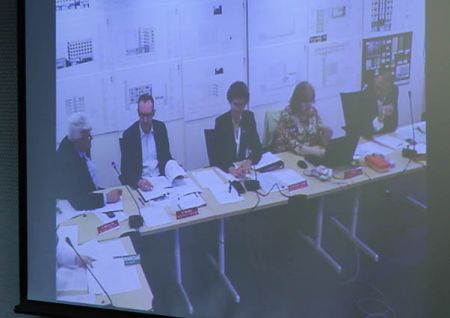
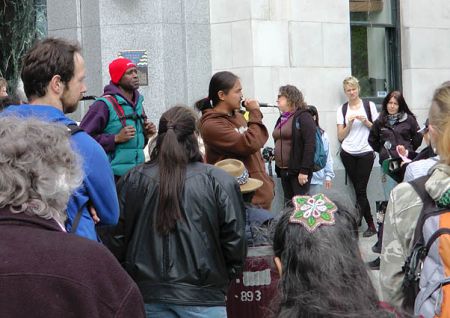
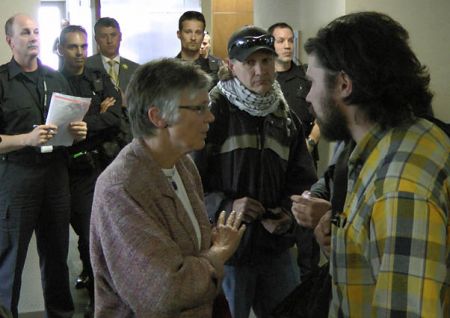
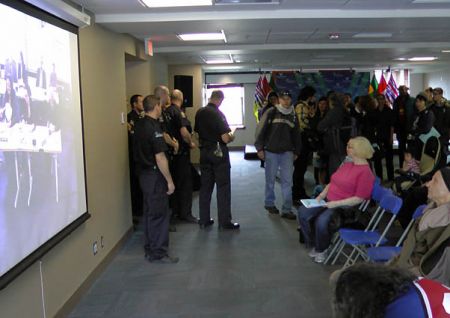
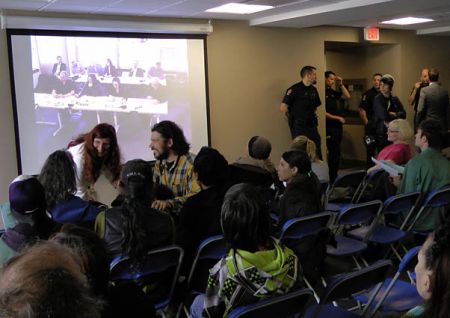
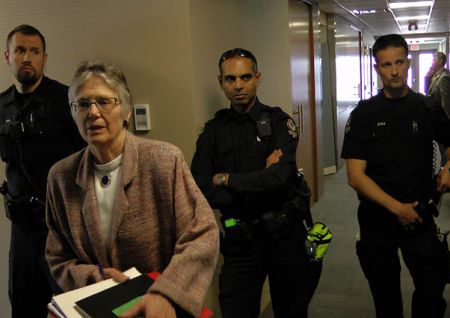
Commentaires
More Truth than Fiction
Joseph Jones “mixes it up” at more than City Hall.
He mixes up the story of the original Pantages Project completely. His story would be more convincing if it were more accurate.
Here’s what Jones wrote: “‘Malicious incompetence’ on the part of unnamed city staff persons resulted in failure of the efforts to save the Pantages as a heritage and a community space.”
Whose efforts were these, Joe? You don’t tell us.
They were the efforts of the same Marc Williams! And the non-profit Pantages Theatre Arts Society. They tried for FOUR YEARS to restore the theatre, build a 99-seat black box, turn the old lobby into a DTES art gallery, build a new lobby, and create a café to be run by Potluck.
And – get this – Williams wanted to build 138 UNITS OF SOCIAL HOUSING NEXT DOOR! One hundred and thirty-eight. Twelve storeys. Why don’t you tell us this, Joe? Williams’ original proposal is on file at City Hall. You can read it for yourself. Or read it in the Sun, the Province, the Straight and dozens of other places. It was no secret, except to Jones.
Marc Williams’ new project is called ‘Sequel’ because the “efforts” he made were turned down. Twice. He led those “efforts” for four years. Why don’t you report that, Joe?
The same people who opposed Sequel also opposed the original Pantages Project. They could have had 138 social housing units. But they opposed Williams then too. Great leadership. Now they’ve got 18.
1295 Words, One Sentence, 251 Words
You have latched onto one sentence out of 1295 words in order to call for out-of-scope research on a tangential point. This story is about what I happened to perceive at City Hall on 23 April 2012 in the space of five to six hours, not about the history of the Pantages property.
Your 251 words appear to have some content and might be more useful and credible if the writing were better organized and published as a separate VMC story under whatever your actual name is.